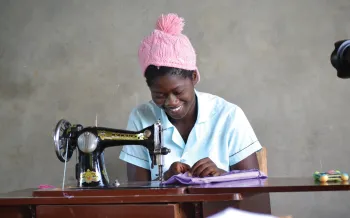PANDEMIC SEWS NEW ENTREPRENEURIAL OPPORTUNITIES FOR WOMEN IN ZIMBABWE
"The mask project provided a much-needed pandemic service to neighbors ... while extending a modest income to participants, who otherwise might have been left without livelihood in a critical season." -Rev. Dr. Laurie Kraus, Director, Presbyterian Disaster Assistance

COVID-19 has created hardships across the world — but it has also sowed opportunity out of unprecedented adversity.
Case in point is Zimbabwe, where Presbyterian support has helped Uniting Presbyterian Church in Southern Africa (UPCSA) encourage 30 local seamstresses into a new entrepreneurial venture: making fabric face masks to protect their communities, and support their families during the pandemic.
Like many other parts of the world, the Zimbabwe government mandated that masks be worn outside of the home to stop the spread of the virus. Unfortunately, face masks are very expensive in Zimbabwe and the ordinary person cannot afford them. At the same time, COVID-19 has also impacted many of the small businesses in the country, disrupting the normal work of seamstresses and putting their livelihoods on hold.
Gifts given through the Presbyterian Giving Catalog not only helped the project supply fabric, elastic and thread to create the masks, it supported the Presbytery of Zimbabwe of the UPCSA’s Presbyterian Capacity Building Unit in mentoring the women, providing mandatory health education about COVID-19, training them in the production of masks that met statutory guidelines, and ensuring quality control of the product. UPCSA also played an important role in the supply chain, ensuring that masks were collected from the seamstresses and distributed to those who needed them, with most sold in bulk to Zimbabwean shops and church schools. The bulk sales strategy allowed for social distancing and gave participants a means to sell their masks without the traditional market structure, which was disrupted to stop the spread of the virus.
The benefits of the project have been impactful and far-reaching. Profit generated as income helped support families in the midst of a financially uncertain time and fostered hope by empowering Zimbabwean women to create a sustainable business that could provide long-term livelihood. Beyond that, the community has also benefited from the availability of locally produced, affordable masks and a means to fight COVID-19 where they live and work.
